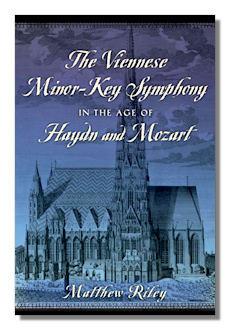
The Internet's Premier Classical Music Source
Related Links
-
Introduction
Acoustics
Ballet
Biographies
Chamber Music
Composers & Composition
Conducting
Criticism & Commentary
Discographies & CD Guides
Fiction
History
Humor
Illustrations & Photos
Instrumental
Lieder
Music Appreciation
Music Education
Music Industry
Music and the Mind
Opera
Orchestration
Reference Works
Scores
Thematic Indices
Theory & Analysis
Vocal Technique
Search Amazon
Recommended Links
Site News
 Book Review
Book Review
The Viennese Minor-Key Symphony in the Age of Haydn and Mozart

Matthew Riley
Oxford University Press, 2014
Musical examples, notes, tables, glossary of analytical terms, bibliography, index
Acid-free paper, 284 pages
ISBN-10: 0199349673
ISBN-13: 978-0199349678
ISBN 978-0-19-934967-0 (hardback)
ISBN 978-0-19-934968-5 (electronic text)
ISBN 978-0-19-934969-2 (online content)
Riley presents the results of meticulous and detailed research into a highly specialized area of musicology. His audience will be scholars, primarily, but some at least of his findings may interest those with a more general interest in the period he considers. Little in the historical sources is even available about some of the composers he considers, but some of the statistics he presents have the capacity to astonish, such as the vast number of symphonies – let alone those written in minor-keys – written in the eighteenth century. Speaking for myself, I never noticed before that, among the more than forty symphonies of Mozart, only two are in minor keys.
And, if I may be permitted another personal aside, Riley's subject holds some interest for me on account of something I wrote about in my book Neoclassical Music in America: the fact that a 1948 Piano Sonata in F minor by Harold Shapero had a key designation at all – and was notably influenced by the first Viennese classical period – provoked boos, hissing and catcalls at its New York premiere, led by a young composer enamored of the second Viennese school.
The symphonists Riley has studied, besides Haydn and Mozart, include the imperial court composers G.C. Wagenseil, F.L. Gassmann, and K. Ordonez; also J.B. Vanhal, G.B. Swieten, P. Wranitky, F.A. Hoffmeister, L. Kozeluch, and the well-known Dittersdorf. I confess to having been totally unfamiliar with the music and careers of most of these, but what Riley wrote about Vanhal, for one, is interesting enough to have motivated my ordering a recording of some of his symphonies.
Of particular interest specialists will be Riley's up-to-date discussion of findings and theories of writers like H.C. Robbins Landon, for instance. Much of his analysis is technical: such as discussion of the "mediant tutti," "modal reversal" (switch from minor to major during recapitulation, for instance), and contrapuntal minuets. How many non-specialists have an inkling that the fact that Haydn's including a dance form like the minuet in a symphony was actually frowned upon by critics in Berlin? Haydn had the last laugh on that. So there is something here for many readers.
Recommended.
Copyright © 2015 by R. James Tobin.



















